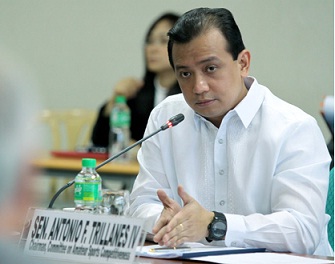LAWYER Edward Serapio, former presidential counsel during the Estrada administration, once told me when he was under detention in Camp Crame in connection with Estrada’s plunder case way back in 2001, that he was so grateful for the wife of then Philippine National Police head Leandro Mendoza serving him coffee when he surrendered early in the morning at the White House, the PNP chief’s residence.
 One can imagine Serapio’s level of stress at that moment and he said Mrs. Mendoza’s act of kindness did a lot to calm him down. He said he’ll never forget it.
One can imagine Serapio’s level of stress at that moment and he said Mrs. Mendoza’s act of kindness did a lot to calm him down. He said he’ll never forget it.
Yesterday, Sen. Juan Ponce- Enrile thanked the PNP for treating him kindly, allowing him to stay at the PNP General Hospital in Camp Crame upon his surrender last Friday and allowing him to have his check up at the Asian Eye Institute in Makati the next day.
At this time when the popular sentiment is to throw stones at all those accused in the plunder of people’s money (Enrile, Jinggoy Estrada, Bong Revilla et al), any act kindness to those who are down is the true essence of humanity.
It is not about the guilt of the accused. It is humaneness.
While we should be vigilant that justice is obtained in the pork barrel scam, we should also be conscious of the danger that in pursuing justice, we become hardened and lose our sense of humanity. That would be a tragedy.
The government is getting flak for giving the three senators and their co-accused a decent treatment .Never mind that it is not up to the lifestyle that the accused are accustomed to. With the whole room to each of them and an electric fan, that is luxury.
Those who have been a Philippine jail know the inhuman condition of prisons in the country.
A report by The Optional Protocol to the United Nations Convention against Torture and Other Cruel, Inhuman, or Degrading Treatment or Punishment (OPCAT) documents the “brutalizing” conditions in Philippine prisons and jail.
Part of the report says: “Extreme overcrowding is the most punishing aspect of doing time in jails maintained by the Bureau of Jail and Management Penology (BJMP), which is an agency of the Department of Interior and Local Government. In 2001, about 35,000 inmates were fighting for space in jails supervised by the bureau. Today, the number has jumped to 69,500.
“The jails in Metro Manila account for 22,000 inmates which is more prisoners than the official capacity they can accommodate. At the Manila City Jail and other prisons in the National Capital Region, inmates have to take turns sleeping on the floor.
“Based on government projections, the total jail population in BJMP-supervised jails could reach 89,000 in 2008, 101,250 in 2009 and 114,930 in 2010, way beyond the capacity of these holding facilities. These figures are only for the municipal and city jails which are under the care of the BJMP.
“Over congestion also brutalizes life in penitentiaries and in provincial jails. The projected populations of national prisons administered by the Bureau of Corrections, an agency of the Department of Justice and the jails maintained by the provincial governments must be as dreadful.
“Herding individuals in cramped spaces is cruel, inhuman, ill, degrading, and unjust punishment. Overcrowding is dangerous to health and to human life. It breeds diseases, breaks down discipline and exacerbates tensions. Having to fight for air and space 24 hours a day make prison, in the words of inmates, a living death.
 “Add dirty tap water, dingy toilets, substandard meals, gang war, poorly trained guards and prison administrators, favoritism, and you have a system built for punishment, not for rehabilitation. This is not the enlightened approach to penology which is reform geared towards a subsequent productive life upon reentry to the community. It is a throwback to the 18th century that treated prisoners as animals unfit to renew themselves and rejoin society.”
“Add dirty tap water, dingy toilets, substandard meals, gang war, poorly trained guards and prison administrators, favoritism, and you have a system built for punishment, not for rehabilitation. This is not the enlightened approach to penology which is reform geared towards a subsequent productive life upon reentry to the community. It is a throwback to the 18th century that treated prisoners as animals unfit to renew themselves and rejoin society.”
While others may want to dump Enrile, Estrada, Revilla et al to one of those God-forsaken jails, Sen. Antonio Trillanes IV, who spent seven years in detention (three in that Camp Crame quarters where Revilla and Estrada are confined) is pushing for the passage of Senate Bill No. 793 or the Jail Integration bill which proposes for an integrated prison and jail system that provides professionalism in the rehabilitation and treatment of prisoners.
“We are promoting a just and humane society and to treat detainees like dogs is not the way to go. We have to improve our detention facilities and construct new ones to make sure that these detainees will not lose their dignity while in jail,” Trillanes said.
